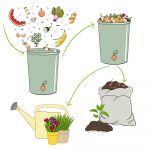The “zero waste” lifestyle is becoming more popular all the time, but what exactly do people mean when they say “zero waste”?
Is it really possible to waste nothing? While it can sound like something out of a science fiction novel, the truth is that the zero-waste lifestyle is catching on, is easier than you think, and does indeed make a big difference to your community and also the world.
What Is Zero Waste?
When you think about putting out your garbage cans every week, do you ever think about how many bags of garbage are in each of these cans?
Many people have full garbage cans every week, while others – myself included – have roughly one bag of garbage per week to add to the landfills.
If you’re thinking, but I can’t recycle or reuse everything, that’s understandable.
However, the truth is that you can reuse and recycle a lot more items than you think, and it doesn’t just stop with plastics for the recycling bin and save eggshells for your compost.
The main goal of zero waste is to produce as little trash as possible.
Zero-waste advocates live by the following rules:
● Rethink everything you think you need and how you buy those items.
● Refusing things you don’t need – don’t be afraid to say “no”!
● Reducing the things you do use and always focusing on products that last.
● Reusing everything you already own.
● Repairing anything that’s possible to repair instead of throwing it away.
● Recreating things whenever possible; for example, choosing DIY instead of the alternatives.
● Composting all of your food wastes.
● Recycling as little as possible (what?).
The bottom line is this: zero-waste enthusiasts have one goal in mind, and that is to make sure very little (or if possible, nothing) will be put in the landfills.
A difficult task? Yes, but it’s easier than you think once you get into the right mindset.
Once you start thinking about how important creating zero waste is, it will be in the back of your mind constantly, which means you’ll find it much easier to do the things you need to do to fulfill that goal.
Becoming a Zero-Waste Advocate
The zero-waste lifestyle is gaining momentum in this country, and if you’re thinking about jumping on this bandwagon, there are some things you can do to increase your odds of success.
Below are a few of those things.
● Don’t worry about how everyone else is doing. Everyone’s situation is different, and everyone’s access to resources is different. If you need medications or over-the-counter products for your health and they’re wrapped in plastic, go ahead and buy them. Your health is more important than that. If your small town has no bulk store and you can’t buy in large quantities, go ahead and buy standard sizes. Your situation will always be different than the person next to you. Just do the best you can when it comes to living a trash-free, sustainable life.
● Stop feeling guilty. You’ll naturally have goals for living a zero-waste life, but you have to accept the fact that you likely won’t meet all of those goals. If you throw something in the trash can instead of the recycling bin and you’re feeling guilty – stop! The point is not to do everything perfect. Instead, the point is to do your best every single day and make a conscientious effort to waste as little as possible. Accept the fact that you’re going to make mistakes and just concentrate on doing the best you can.
● Make it a priority not to buy products with packaging. Products with packaging are horrible waste of resources, but it’s a great start if you start small. By small we mean, shoot for the 90/10 rule – try to buy 90% of your products in recyclable form and 10% that cannot be recycled. If you can accomplish 100%, that’s even better, but most people find that impossible. If 90/10 isn’t possible, shoot for 80/20 or even 70/30. In fact, any number will work, as long as you’re doing your best to make the number higher at some point.
● Do not overthink the situation. It’s easy to get so caught up in this lifestyle that you end up feeling like a failure because you’re not always accomplishing what you’ve set out to do. Your goal is to be a conscious consumer, lowering your waste, and recycling more, but you don’t have to think about it 24/7 and make yourself stressed. Relax, take a deep breath, and do the best you can to live a zero-waste life. You’ll end up saving a lot of money and the planet will thank you for it.
Is Recycling Bad?
We mentioned earlier that you should “recycle as little as possible.” Does that mean recycling is bad? Of course not.
What it means is, since recycling should come after the prevention of waste, it should be considered a last resort, so to speak.
You should first try not to purchase anything in any type of container or package, whether it’s plastic, cardboard, or anything else.
But let’s say you are interested in buying a certain product at the grocery store but you cannot find it in bulk form.
In this case, you’ll have to buy the product with the packaging of some type. Afterward, you can recycle the package if at all possible, but first, you should try to buy products without it whenever possible.
If you’re finding it difficult to shop in bulk even though you’ve tried several stores.
here are some tips to keep in mind that will help make recycling truly a last resort:
● Look for stores that sell in bulk. It isn’t just the huge mega-stores that have bulk sections; many smaller grocery stores have them as well. They may not have as big of a selection as the larger stores, and the bulk compartments might be smaller, but it shouldn’t be difficult to find stores that offer this to their customers.
● Buy loose when you can. If you buy reusable produce bags, you can purchase a lot of your fruits and veggies loose, which is a big help when you’re trying to accommodate a zero-waste lifestyle.
● Get used to using reusable products. These include reusable water bottles, bags, mugs and drinking glasses, and metal straws.
● Visit farmers’ markets. Most big cities (and many smaller towns) have farmers’ markets at least once a month, sometimes once a week. If your city has a farmers’ market, try to visit them to buy your fresh produce as often as possible.
● If you can’t avoid the packaging, at least try to get packaging that you can recycle. Check on the package itself to make sure it can be recycled, then you won’t have to feel like you’re letting Mother Earth down when you buy it.
If you think we’re talking about packaging a lot, there’s a reason for this.
Packages and containers take up tons of room in any given landfill, and therefore it’s best to avoid them completely if at all possible.
Although most packaging made these days is recyclable, many of them are not.
Again, you’ll have to read the packaging itself to know for sure, but a few seconds of reading is a small price to pay for making sure you get something recyclable in the end.
Is a Zero-Waste Lifestyle Worth it?
This is the question most people have when considering a zero-waste lifestyle.
If you think it isn’t worth it because not everyone is doing it, think again. The zero-waste lifestyle is worth it for two main reasons:
● More and more people are shooting for a small carbon footprint than ever before, so you’re not alone.
● Every little bit helps … a lot! Never underestimate what a difference you’ll be making all by yourself.
All of this being said, there are a few bad sides to zero-waste lifestyles, but they are minor compared to the advantages.
For one thing, it is virtually impossible to be completely “zero” waste, although you can come close.
Second, waste isn’t the only thing that harms the environment because even traveling on vacation can waste resources.
Finally, the term “zero” gives the movement a negative image.
None of these reasons, however, is good enough to give up on being a zero-waste advocate.
You certainly have more to gain than to lose when you choose to participate in this type of lifestyle.
Conclusion
Zero waste can sound more complicated than it is.
The fact is, it is likely going to be more expensive for you if you practice this lifestyle, and it is certainly going to be more time-consuming.
But in the end, it is going to be worth it.
Everything just one person can do makes a huge difference in saving the planet, and the truth is, most of the things listed in this article are very simple to do.
Simply paying attention to the decisions you make will become second nature before you know it, and you’ll be able to feel good about knowing you’re making a difference in this world of ours.



